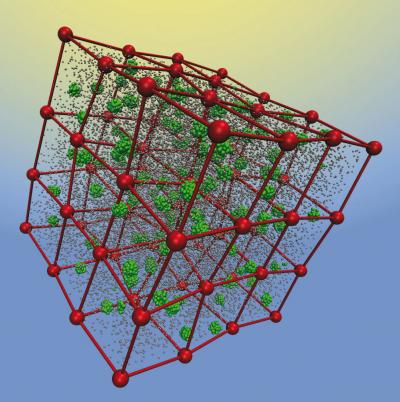Jan 18 2013
In developing these novel self-assembling materials, postdoc Barbara Capone has focused on the design of organic and inorganic building blocks, which are robust and can be produced at large scale. Capone has put forward, together with her colleagues at the Universities of Vienna and Mainz, a completely new pathway for the construction of building blocks at the nanoscale.
 This image shows a simulation snapshot of a cubic crystal built of soft patchy diblock star polymers. Credit: American Physical Society
This image shows a simulation snapshot of a cubic crystal built of soft patchy diblock star polymers. Credit: American Physical Society
"Soft Lego" orders in crystal structures
The team of researchers has shown that so-called block copolymer stars – that means polymers that consist of two different blocks and they are chemically anchored on a common point – have a robust and flexible architecture and they possess the ability to self-assemble at different levels. At the single-molecule level, they first order as soft patchy colloids which serve then as "soft Lego" for the emergence of larger structures. At the next level of self-assembly, the colloids form complex crystal structures, such as diamond or cubic phases.
The spatial ordering in the crystals can be steered through the architecture of the "soft Lego" and opens up the possibility for the construction of new materials at the macroscopic scale with desired structure. In this way, crystals can be built that have applications in, e.g., photonics, acting as filters for light of certain frequencies or as light guides.